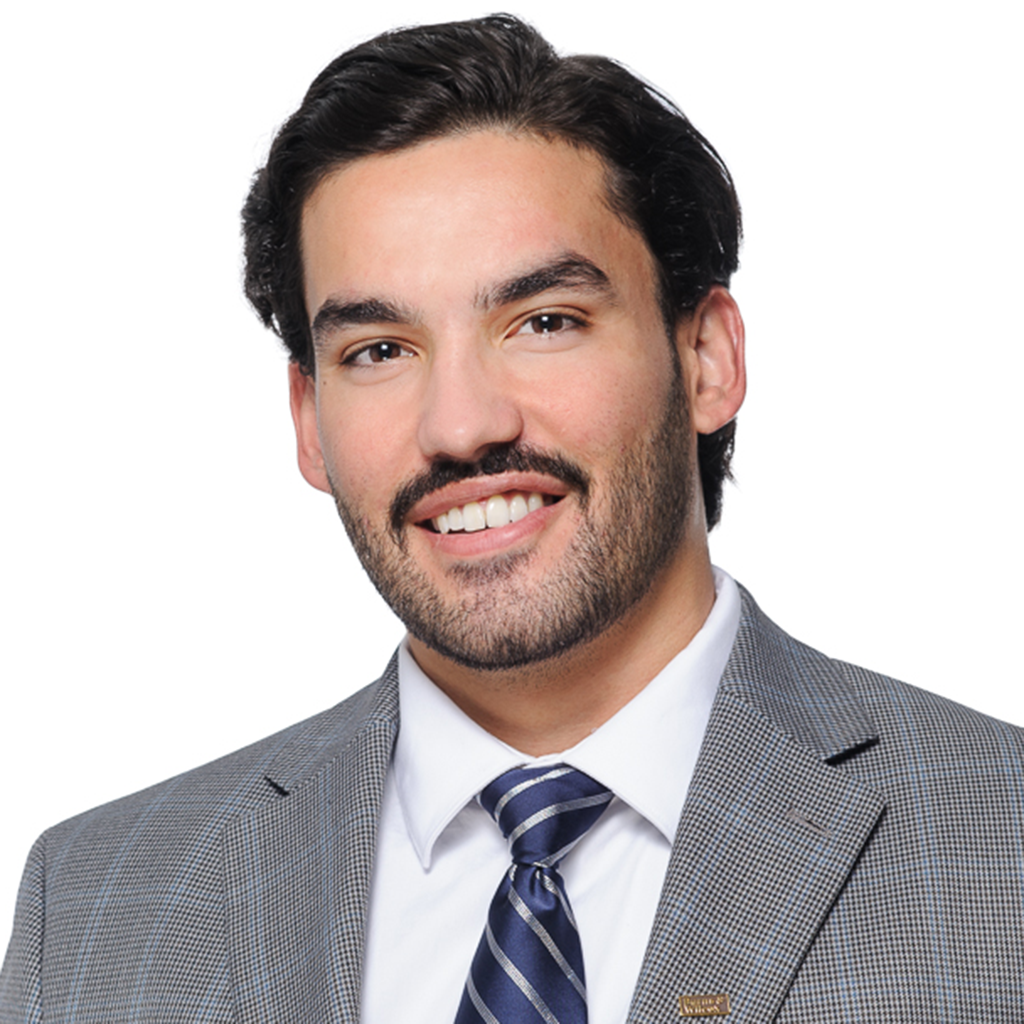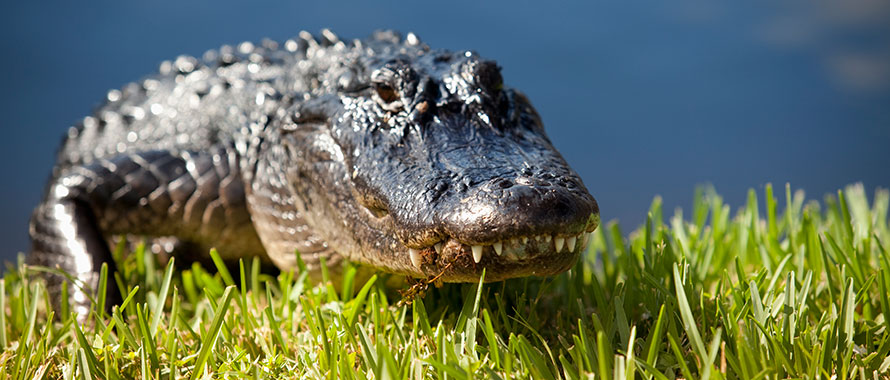The family of an 85-year-old woman who was fatally attacked by an alligator while walking her dog in her Florida backyard has filed a lawsuit against the housing complex’s owners. According to the Associated Press, the suit filed January 25 against Wynne Building Corp. alleges its employees were aware of the alligator at the Spanish Lakes senior housing complex and failed to have it removed from the retention pond before the deadly incident, which took place in February 2023 in Fort Pierce, Florida.
Featured Solutions
“It is a tragic story,” said Brady Smith, Underwriter, Commercial Insurance, Burns & Wilcox, Orlando, Florida. “There are definitely some shocking circumstances, and it seems like something that could have been avoidable. When an alligator gets to a certain size, it becomes more of a threat to individuals, and you must act.”

It is a tragic story. There are definitely some shocking circumstances, and it seems like something that could have been avoidable
Some of the costs associated with the lawsuit, which did not specify the amount of damages the family is seeking, could be covered under a housing complex’s Commercial General Liability (CGL) Insurance, said John Heaner, Associate Vice President, Burns & Wilcox, Tampa, Florida.
“Whether you maintain the premises to a high standard or not, there is vicarious liability that you assume just owning property or running a business,” Heaner said. “It could also fall under Directors & Officers Insurance, because they could allege that the facility’s board or association was negligent in making sure the premises were safe for their residents.”
Fatal alligator attacks rare; signage may not remove liability
Unprovoked alligator attacks are exceedingly rare; in Florida, the risk of being attacked is about 1 in 3.1 million, based on Florida Fish and Wildlife Conservation Commission data, CBS News reported late last year. More than 450 alligator bites have been recorded in the state since 1948, 30 of which were fatal, ClickOrlando.com reported on January 4. Although bites are uncommon, some bodies of water in the state are known for being a greater risk than others because they are home to more gators, according to the news outlet. Alligator attacks have also been reported in South Carolina, Louisiana and other Southern states.

Whether you maintain the premises to a high standard or not, there is vicarious liability that you assume just owning property or running a business.
“It is kind of like shark bites — you hear about the ones that actually happen. They are not common, and alligator bites are not common to humans either,” Heaner said, pointing out that alligator attacks against small pets are much more common. “That is definitely something that individuals need to think about when they live in Florida, because every single pond or lake that I know of in the state of Florida has an alligator in it, or you assume it does.”
Despite incidents being infrequent, the risk of deadly attack is a serious consideration for any commercial property owner in states like Florida, including at housing communities, golf courses and more. In 2016, a toddler was tragically killed by an alligator at a lagoon at a Disney World resort; the family said they would not sue Disney, CNN reported, and the company has since installed additional signage and roped off the lagoon.
Commercial property owners “have a duty” to report alligator sightings and ensure that any dangerous animal on the property is properly dealt with, Heaner explained. In the case of the recent lawsuit against the housing complex, “the fact that they allegedly did not do anything at all is pretty problematic,” he said. Still, “even if you put a sign up that warns individuals, that does not give you complete immunity,” he said.
A standard CGL Insurance policy would typically include coverage for this type of incident under Coverage A – Bodily Injury, providing coverage for expenses such as legal defense and potential punitive damages. “It could pay up to the policy limit, unless there was some sort of specific exclusion attached to the policy,” Heaner noted. “An animal exclusion sometimes is added on to CGL Insurance policies that could preclude coverage, but without that form, there would not usually be any kind of exclusion for animal [attacks].”

The damages could be a pretty sizable amount. That is what the insurance is there for — to respond in situations like this.
A lawsuit like this is likely to come with significant legal costs and settlements that could exceed policy limits, which could then trigger a company’s Excess Liability Insurance, Smith said.
“The damages could be a pretty sizable amount,” he said. “That is what the insurance is there for — to respond in situations like this. Even if the homeowners association or complex was negligent in some way, they still have the coverage for that. That is why it is important to have proper liability coverage in place, as well as excess limits.”
Those additional liability limits are often crucial in this type of case, Smith said. “An insurance broker should be recommending Excess Liability Insurance,” he said. “The amount is going to vary based on the size, how well-protected they want to be and what they think their exposure is, but having excess limits in place is usually recommended.”
Lawsuits may target ‘any policy’ property owners have
Alligator attacks are not the only wildlife-related risk that commercial property owners must keep in mind when assessing the safety of their premises. In 2019, a Florida woman filed a lawsuit against Walt Disney World after being attacked by a bird while walking on a dock at the Polynesian Village Resort, causing a traumatic brain injury, FOX 13 Tampa reported at the time. At a golf course in Evergreen, Colorado, a man was seriously injured in 2020 after an elk charged his golf cart, KDVR reported.
In Florida, any property with a body of water is likely to face a higher premium for CGL Insurance due to the increased risk of water-related incidents, Smith said. “When rating a property like this and there are bodies of water on the premises, there is a rating attached for that and additional premium to account for the increased risk of drownings, the possibility of alligators, or whatever it might be,” he said.
After an incident, the business involved could face lawsuits that name its board of directors or a housing complex’s homeowners association members. This is when D&O Insurance could be triggered, Smith said. Oftentimes, a suit will “just rope in all of the carriers on this risk and work through the legal process to figure out where they are going to have the best chance of getting a claim paid,” he said.
Heaner agreed, saying attorneys are likely to “attack any and every insurance policy they have.”
Given the rising cost of defending against a lawsuit, business owners should ask their broker about whether their CGL Insurance policy includes defense costs inside or outside of their limits, Smith suggested. “Those defense costs can add up quickly and it could take away from your limits,” he said. For example, with $1 million limits, “if you get defense costs within the limits and you have $100,000 in attorney fees and a $1 million settlement, that will exceed the limit and then the insured is on the hook for the rest.”
“That is something to look out for — that the policy language is written in their favor,” Smith said.
Managing risks amid ‘hard market’ for insurance
Senior living communities are in a particularly “hard market” for CGL Insurance, Heaner said. This makes coverage more difficult to find an affordable rate — and a costly claim over a serious incident could make that process more challenging.
“A loss or something like this where it could potentially be a payout at full limits could be detrimental to their business,” he said. “Not only would they see a spike in premium because of the loss, but they could be looking at whether anyone would even insure them.”

Building a case — acknowledging something was wrong and what they are going to do to mitigate that — is what the insurance companies are going to look for.
A company “does not have to insure you,” Heaner noted. “They would need to be able to show what kind of steps were put in place after the fact. In the hard market we are seeing, a lot of times when you have a claim like this, you could have a tough time even finding coverage in the first place, and then you might not get the same limits or coverage. Building a case — acknowledging something was wrong and what they are going to do to mitigate that — is what the insurance companies are going to look for.”
This could include having risk management and incident response plans in place, such as written protocols for reporting alligator sightings, taking immediate action after incidents, and implementing precautions such as fencing and signage wherever possible.
“Ever since the [Surfside] condo collapse in south Florida, there has been huge scrutiny on the level of oversight that HOAs and boards of directors are using when it comes to things like proper maintenance of a property,” Heaner added. “There should be some checks and balances or procedures in place. Recognize any potential hazards and take as many precautions as you can.”
The same advice applies for any wildlife risks on commercial property, Smith pointed out. “It is important to have notices posted about alligators or other dangerous wildlife around so that individuals are able to steer clear or be more aware,” he said. “If you have a 10- or 11-foot gator in your lake, get rid of it — do not have your employees feeding it.”







